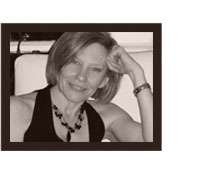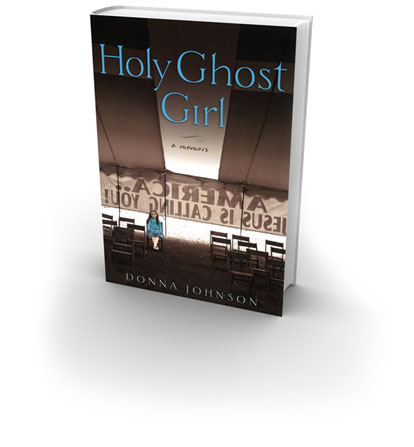Author Q&A
An Interview with Donna Johnson:
1. What did you hope to accomplish in writing Holy Ghost Girl?
The writing allowed me to go home again, to sift through my childhood and try to reconcile the world I experienced as a kid with the more rational world I lived in as an adult. As a writer, I also wanted to explore the mysterious nature of reality and human beings. Our views of life and people have become overly simplistic, like a Disney movie. Everything is black or white, good or evil. Religion has helped bring about this idiocy, but so have the media and the unexamined assumptions we accept at face value as individuals. When I looked back at my childhood, I realized my experience of the world was more nuanced. Terrell was both an angel and a monster. My mother loved me and yet failed me in so many ways. Reality was a dappled thing, neither black or white and thus hard to pin down or sum up.
2. You spent many years trying to sever all connections to Brother Terrell and his ministry. Yet, you don't seem to blame him or indulge in any self-pity about the way you were raised. How long did it take you to get to this point? Are you using humor as a way to deflect the pain?
At times I have blamed Terrell and my mother for the hardships of my childhood, but when I considered the harshness of their childhoods, and all that they did without, I realized there really is no one to blame. It's hard to accept that, where we kids were concerned, they thought they were doing what God wanted them to do. Were they also making selfish choices? Of course. Don't we all to some extent? The process of writing the book stirred up and also helped dissipate animosity toward my mother and Terrell. I tried to write out of compassion for the discrepancy between who they wanted to be and how far from their ideals they strayed. I could do that because I too have failed myself and others in big ways. I think the humor came naturally as I detached enough from my story to see it as exactly that, a story. As for using laughter to deflect pain, couldn't that serve as a working definition of comedy?
3. Is there anything you regret including in—or excluding from—your book?
Of course! I wish I had done a better job of reflecting the contradictions and oddities embodied by Terrell. He picked up hitchhikers, bought them meals and sent them on their way with enough money to ensure they could rent a motel room for a night. He tried to respond to everyone in need, and yet he took money, and in later years, a lot of money, from the poor and used it to fund a somewhat lavish lifestyle. He is also a very twitchy person, given to tics. I'm not sure I adequately conveyed that physical aspect of him.
4. Have you ever confronted Brother Terrell about the way he treated your mother?
After spending much of my childhood trying to manage their relationship, I finally decided it wasn't my business. Terrell has apologized to my mother on two occasions.
5. How many of your siblings have remained Terrellites? Do your three half-sisters maintain relationships with him?
Only my brother has remained close to the Terrellite faith, though he would say his beliefs have changed drastically. As for my sisters' relationship with their dad, that's not for me to discuss.
6. Brother Terrell seems to attract ardent protectors. Are you concerned about any potential repercussions from revealing what you've written?
The Terrellites are a passionate group, but they've never been violent. Still the book has already stirred animosities and harsh words within the extended family. At times I do worry that one of faithful might physically accost me as a result of the book.
7. In remembering your time with Sister Waters, you write, "Having no idea I was a poverty-stricken kid, I pretended to be poor" (p. 150). It seems incredible that—despite your lack of clothes and food—you didn't realize you were poor. At what point did this realization sink in?
I didn't realize we were poor because everyone around us was poor, and I had no TV image with which to compare our life style. Plus when we (the kids) traveled with our parents, we never went hungry. Bologna is not the best food, but it was a staple for lots of families in the South. For some reason, life with Sisters Waters was desperate at every level. It's possible the ministry was going through one of its many down times, and that my mother and the Terrells didn't have enough money to send back to Sister Waters for groceries. Or maybe she used the money for other things. It may sound odd, but only when I reflected back during the writing of the book did I realize that we were poor!
8. This year, the New York Times published a study indicating a strong correlation between religion, education level, and income—with Pentecostals representing the lowest end of the spectrum. And you write that your mother was "one of the few in the evangelistic team with a high-school diploma" (p. 69). Why do you think this branch of Christianity gives such short shrift to education?
From the perspective of an outsider at least part of the answer might be that people with an education are more given to questioning the rule-bound theology of Pentcostalism. The insider perspective is more complex. If you believe the world will end at any moment and that God has commissioned you to save as many souls as possible before the Apocalypse, education falls toward the bottom of your priority list. The hierarchy of needs also comes into play. When you're struggling to survive and your kids have to work to help put food on the table, education can seem a luxury. But neither of these answers fully addresses the question. Many Pentecostals do not value material things. Possessions and status mean nothing to them, so to pursue an education to increase one's standing in the world makes no sense. It is the unseen world, the world of the spirit, that matters. Terrell lost sight of this value system once the money started rolling in, but the principles I'm describing here are still alive in many of the small backwoods Pentecostal churches that exist today. It could well be argued that this radical anti-materialism (minus the anti-education stance) is at the true heart of Christianity.
9. Not long ago, another preacher, Harold Camping, predicted that the end of the world would occur on May 21, 2011. Based on your own experience with Brother Terrell's failed prophecy, how do believers react after the world continues as usual?
Camping has recalculated judgment day twice, saying he made a mathematical error. I've read that millennialists tend to rationalize why the world continues so that it makes sense within their belief system. For example the Branch Davidians who followed David Koresh (and survived the fire) still believe he was a true prophet and one who may very well return. Terrell's fall from grace caused many long time followers to dessert him. The ones I know joined charismatic mega-type churches and still espouse a literal interpretation of scripture and divine one-on-one revelation—two tenants I believe enable the rise of prophets like Terrell.
10. At what point did you tell your daughter about your early life? How did your experiences inform the way you chose to parent?
I never wanted to burden my daughter with the painful aspects of my early life—so we never had that kind of talk. On occasion my mother would take her to a revival without my permission. Once she came home insisting she needed to be saved, but she wasn't sure what from. On another occasion she wondered what God had against earrings. I made many mistakes in parenting my daughter, but I did some things right too. I married a man who had experienced a loving, stable family and knew how to recreate that for my daughter. We stressed higher education and encouraged and supported her participation in a variety of school activities. I wanted my daughter to know she could accomplish things in the world and that the world was a beautiful place, worthy of any effort she might invest in it. The best values of Pentecostalism were incorporated into our lives—a lack of emphasis on material things and the understanding that we are our brothers' and sisters' keepers, and that if we see others suffering it is our responsibility to respond on a human level and not just write a check.
11. Do you have plans to write another book?
Yes, I am considering two very different ideas, both nonfiction projects.
Donna Johnson has written about religion for The Dallas Morning News and other publications. Holy Ghost Girl won the Mayborn Creative Nonfiction prize as a work in progress. Donna lives in Austin, Texas, with her husband, the poet and author Kirk Wilson.

